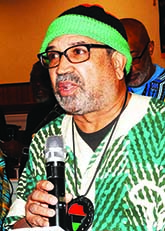
Celebrating Carter G. Woodson: The Father of Black History

By Makheru Bradley

The story of Negro History Week, which has become Black History Month, begins with the remarkable journey of Carter Godwin Woodson. Woodson was born in Buckingham County, Virginia in 1875, the son of two formerly enslaved Afrikans; James and Anne Eliza Woodson. James Woodson was a Civil War veteran as well as a carpenter and farmer.
After a sporadic early education, due to having to work on the family farm and in coal mines, Carter Woodson finally enrolled in high school at age 20. He finished high school in one year and after several teaching jobs, Woodson attended Berea College for two years, obtaining his first college degree. From there Woodson spent four years teaching in the Philippines, which was essentially an American colony after the Spanish American War. In a span of five years 1907-1912, Woodson earned his Bachelors and a Masters Degrees from the University of Chicago, and a PhD from Harvard University. Dr. Woodson became the only person whose parents were born into Chattel Slavery to receive a PhD from Harvard.
In 1915, Dr. Woodson began the work that would earn him the title “Father of Black History.” He observed the oppressive conditions of Afrikan people under the second cycle of white supremacy in the United States – American Apartheid, and decided that one of the major problems of his people was a dearth of knowledge about their history. To correct this problem Woodson and four others founded the Association for the Study of Negro Life and History (now the Association for the Study of African American Life and History). He also published a book titled “The Education of the Negro Prior To 1861: A History Of The Education Of The Colored People Of The United States From The Beginning Of Slavery To The Civil War” that same year.
The Journal of Negro History (now the Journal of African-American History) was started by Woodson in 1916. For two years (1919-1920), he served as dean of the School of Liberal Arts and head of the Graduate Faculty at Howard University. Woodson was also a regular columnist for Marcus Garvey’s Negro World newspaper during this time period.
In 1921, Woodson founded the Associated Publishers, a publishing company. Negro History Week was initiated by Woodson in 1926, and he launched the Negro History Bulletin in 1937. Until his death in 1950, Dr. Carter G. Woodson remained a scholar-activist totally dedicated to the mental liberation and empowerment of his people. He left us with a magnificent model of hard work and achievement to emulate.
Selected Quotes from Dr. Carter G. Woodson
“Negro History Week is the week set aside by the Association for the Study of Negro Life and History for the purpose of emphasizing what has already been learned about the Negro during the year.”
“It is not so much a Negro History Week as it is a history week. We should not emphasize Negro History, but the Negro in history.”
“The case of the Negro is well taken care of when it is shown how much he has influenced the development of civilization.”
“No systematic effort toward change had been possible for, taught the same economics, history, philosophy, literature and religion which have established the present code of morals, the Negro’s mind has been brought under control of his oppressor. The problem of holding the Negro down, therefore, is easily solved. When you control a man’s thinking you do not have to worry about his actions. You do not have to tell him not to stand here or go yonder. He will find his 'proper place' and will stay in it. You do not need to send him to the back door. He will go without being told. In fact, if there is no back door, he will cut one for his special benefit. His education makes it necessary.”
“Philosophers have long conceded, however, that every man has two educators: 'that which is given to him, and the other that which he gives himself. Of the two kinds the latter is by far the more desirable. Indeed all that is most worthy in man he must work out and conquer for himself. It is that which constitutes our real and best nourishment. What we are merely taught seldom nourishes the mind like that which we teach ourselves.”
“History shows that it does not matter who is in power or what revolutionary forces take over the government, those who have not learned to do for themselves and have to depend solely on others never obtain any more rights or privileges in the end than they had in the beginning.”
“If the Negro in the ghetto must eternally be fed by the hand that pushes him into the ghetto, he will never become strong enough to get out of the ghetto.”
For more from the author, follow his blog Makheru Speaks.

